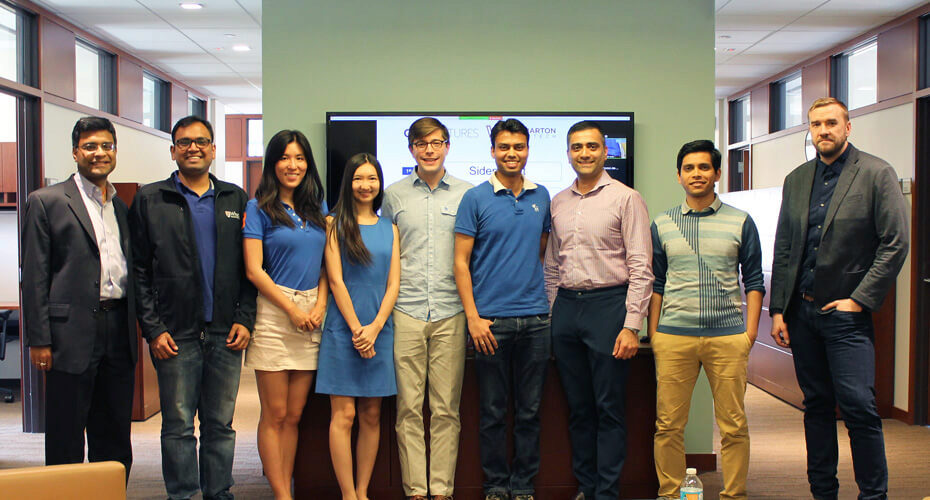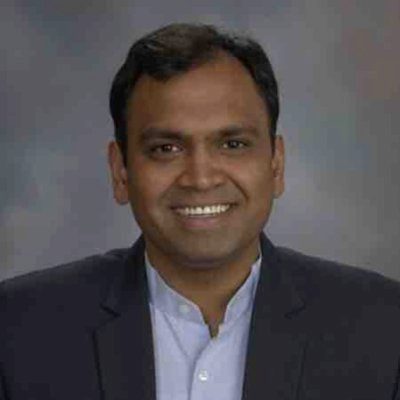The Citi Ventures FinTech Challenge, co-hosted by the Mack Institute and Wharton FinTech Club, was a first-of-its-kind competition that asked Penn students to find solutions to some of the most pressing questions facing financial services today. Digital disruption is poised to transform the industry, and fintech is becoming an increasingly popular field for students who want to do the disrupting themselves.
Of the 26 teams who entered, the winning team responded to the prompt to leverage the power of AI for financial services. Their solution, SidePocket, is designed to be a friendly, smart debt management tool. Team member Aman Jain describes the team’s experience:

From the very start, we sought to create a solution that is smart, is easy-to-use, solves a real problem, and makes good business sense. To make it feel realistic, we were keen to create a prototype and test the solution before presenting to the judges.
As a team we spent significant time brainstorming existing gaps in consumer finance. In some capacity, we all have complex debt situations: debts from credit cards, student loans, auto loans, mortgages, etc. This was true among our Wharton peers as well: we conducted a survey of 100+ MBA students to understand the student debt landscape. Even within a sophisticated student community, navigating through debt(s) is overwhelmingly a concern for the majority. Apart from financial stress, debt also creates a psychological strain which serves to compound the problem.
 After identifying this issue, we dove deep to identify our solution to manage debt while being emotionally supportive, leveraging best practices of the most sophisticated finance professionals and hedge fund managers. We decided to build an emotionally intelligent chat bot named SidePocket that could analyze one’s financial accounts, cash flow situation, and schedule to recommend suggestions for optimally managing debt. What we like best about our solution is that it allows users to maximize their savings in the long run: SidePocket can alert them to money they’re leaving on the table, so users get richer without taking additional risk.
After identifying this issue, we dove deep to identify our solution to manage debt while being emotionally supportive, leveraging best practices of the most sophisticated finance professionals and hedge fund managers. We decided to build an emotionally intelligent chat bot named SidePocket that could analyze one’s financial accounts, cash flow situation, and schedule to recommend suggestions for optimally managing debt. What we like best about our solution is that it allows users to maximize their savings in the long run: SidePocket can alert them to money they’re leaving on the table, so users get richer without taking additional risk.
Why Fintech?
Each of us has our own unique reason that we’re drawn to fintech:
- Bobby is motivated to explore fintech by the size and importance of the financial services industry, combined with the current incumbents’ tepid approach to innovation.
- Sophia, after working in the finance industry for a few years, has witnessed banks’ efforts in automation and believes that innovation in fintech will revolutionize client experience on a global scale. “I’d like to be part of that change, to be on the forefront of innovation and value creation for consumers,” she says.
- Stephanie is drawn to fintech because she thinks it is the future. She has seen lots of exciting innovations in the areas of insurtech and blockchain, and hopes to become part of the future changes.
- Piyush grew up observing his dad run a grocery store in Delhi, India, relying purely on cash for payments. “Fintech has the potential of being inclusive and able to bridge the financial gap that exists,” he says, “especially in developing & underdeveloped countries.” While at Wharton, he is actively working on his mobile payments idea for merchants, EasyPay.
- Personally, I worked in fintech for Deutsche Bank and I strongly feel that technology combined with the availability of financial data creates a unique value proposition to make financial decisions like never before. I am confident that fintech will bridge the gap to access capital, financial services and allow everyone to make smart financial decisions.
What’s Next
To take the prototype to next stage and make a final product, we are actively engaged with Citi Ventures. The team will continue focusing on building a fully functional prototype connected to Citi Group’s product portfolio. We look forward to connecting our SidePocket to our own accounts to test and improve the performance as we continue to build its emotional and business intelligence. And as we get better with our tool, we should be able to take the platform to the wider market.
About the Author
 Aman Jain is a 2017 Wharton MBA graduate from Mumbai, India with 7 years of experience across product management, financial technology and capital markets.
Aman Jain is a 2017 Wharton MBA graduate from Mumbai, India with 7 years of experience across product management, financial technology and capital markets.



